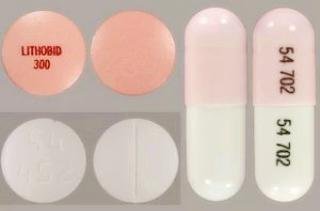What is Lithium?
Lithium is a simple element that occurs naturally and is used as a psychiatric medication or to treat mood disorders. It belongs to a group of medications called antimanic agents, which work by balancing activity and the levels of the brain chemicals. [1, 2, 3, 4, 5]

Lithium is usually first prescribed by a psychiatrist and it has been in use for more than 50 years. It’s also frequently prescribed as a long-term treatment and shouldn’t be stopped when the patient feels better. Lithium is available under different brands which include:
- Lithium Carbonate ER
- Eskalith
- Lithobid
- Eskalith-CR
Uses of Lithium
Lithium is effective and it is used in various ways including the following:[2, 3, 4]
- It is used for a mental disorder such as bipolar disorder and schizophrenia.
- Lithium is used to treat depression by enhancing the effectiveness of antidepressants to help improve the symptoms.
- It can be used for headache, epilepsy, kidney, and liver diseases and seborrhea.
- It’s also used for treating eating disorders such as anorexia and bulimia
- Lithium may also be prescribed for blood disorders such as anemia and low white-cell count.
- It may also be used for treating asthma, herpes simplex, tardive dyskinesia
Lithium Dosage
Lithium is available in solution, capsules, and tablets forms. An average dosage guideline for taking Lithium include:[6, 7]
- For adults, the starting dose is 600 mg or 10 ml thrice daily.
- For long-term treatment, the starting dose is 300mg thrice or four times daily.
- For extended-release tablets, the starting dose is 900mg twice daily for adults and for long-term treatment of mania, the starting dose is 600mg twice daily and is increased up to 1200mg per day.
- For children, the dosage and use of this drug must be determined by your doctor.
Lithium Side Effects
Side effects are undesired effects or symptoms that come about from a medical or drug treatment. Side effects can be mild, severe, or life-threatening, which is also uncommon. All medications can cause side effects and as much as it is effective, Lithium comes with its side effects too. If these side effects persist, ensure to inform your doctor. The common side effects of Lithium include:[1, 3, 4, 7, 8, 9]
- Dry mouth
- Restlessness
- Drowsiness
- Increased urination or thirst
- Loss of appetite
- Loss of interest in sex or impotence
- Changes in your hair or skin
- Vomiting
- Fatigue
- Tremors in your hands
- Stomach pain
- Nausea
- Constipation or indigestion
- Weight gain or weight loss
- Impaired memory
- Acne
- Diarrhea
- Poor concentration
- Rash or itching
- Joint or muscle pain
It’s crucial to monitor your Lithium levels always through regular blood tests because too much lithium in the blood can prove fatal. This drug can cause serious side effects and if they do go for immediate medical assistance or inform your doctor immediately if you experience these serious side effects including:
- Excessive urination
- Blackouts or fainting
- Shortness of breath
- Crossed eyes
- Excessive sweating or thirst
- Fever
- Pounding, slow, fast or irregular heartbeat
- Loss of coordination
- Muscle weakness, tightness, stiffness or twitching
- Slurred speech
- Giddiness
- Swelling of the lower legs, ankles or feet
- Pounding inside of head
- Headache
- Seizures
- Frequent urination
- Speaking or swallowing difficulties
- Confusion
- Hallucinations
- Weight gain is one of the terrifying side effects of Lithium. It can be a psychic and emotional poison that can cause adverse health problems.
- Lithium may also cause side effects that may impair your thinking or reaction so be cautious when driving or doing anything that needs you to be alert.
- Some people also experience Lithium allergy displayed as rash, hives, itching or swelling of the lips, face or tongue. The rash may not be the most dangerous but it’s important to immediately tell your doctor about it.
If a person takes more than prescribed of the Lithium medication once or over time, acute or chronic toxicity may occur and your doctor should be informed immediately because too much Lithium can cause damage to the brain, death, or coma. Side effects of Lithium overdose include:
- Difficulty walking
- Swelling of the lower legs of feet
- Persistent diarrhea
- Marked dizziness
- Irregular heartbeat
- Severe nausea or vomiting
- Lethargy
- Confusion
- Tremors
- Abdominal pain
- Muscle weakness
- Lack of coordination
- Increased thirst
Withdrawal Side Effects
Lithium has zero major addictive properties, therefore, some individuals may not experience withdrawal side effects. However, the main issue associated with sudden withdrawal is a relapse in bipolar symptoms including hypomania or mania. Other possible withdrawal side effects include:
Depression
An individual may experience a relapse in their depression signs if they were using Lithium for the treatment of resistant depressionand suddenly stopped using it. This is because Lithium is thought to stabilize mood.
Bipolar relapse
Lithium is used to treat mania in Bipolar disorder cases and helps stabilize mood, therefore if a person stops taking it they may experience a relapse of their Bipolar symptoms. They may be prone to experience hypomania, depression or mania.
Headaches
This is also a common symptom of withdrawal and it would subside in time. A person can use OTC to help relieve headaches.
Anxiety
When a person stops using Lithium it’s very common they will experience anxiety because it is effective in reducing manic responses and overexcitement and helps calm a person.
Chest tightness
Feeling tightness in the chest is an uncommon side effect and should decrease as your body goes back to normal blood levels.
Irritability
Withdrawal process may contribute to intense irritability as suggested by research.
Emotional lability
Withdrawal from Lithium may result in emotional lability which is characterized by frantic emotional displays or spontaneous crying.
Muscle aches
Some individuals may experience muscle pains and aches when they discontinue taking Lithium and it should subside over time.
Mania
This is quite common especially in persons with Bipolar disorder. They can relapse into mania upon discontinuation.
Sweating
In some cases, people have experienced increased sweating when coming off of Lithium. When withdrawing from most substances, increased sweating is a common side effect.
Flu-like symptoms
A person may experience pains and aches together with nausea, which may feel somewhat flu-like. This is an uncommon side effect.
Suicidal thoughts
This is possible especially among individuals with depression or Bipolar disorder because Lithium is used to stabilize mood and sudden discontinuation is more likely to result in suicidal thoughts or actions.
Reference List
- Lithium Side Effects – https://en.m.wikipedia.org/wiki/Lithium_(medication)
- http://www.netdoctor.co.uk/medicines/depression/a636/lithium-medication/
- http://www.m.webmd.com/vitamins/ai/ingredientmono-1065/lithium
- www.everydayhealth.com/drugs/lithium
- www.mayoclinic.org/drugs-supplements/lithium-oral-route/description/drg-20064603
- www.mayoclinic.org/drugs-supplements/lithium-oral-route/proper-use/drg-20064603
- https://www.drugs.com/lithium.html
- https://www.rxwiki.com/lithium
- Lithium side effects. Available atwww.mentalhealthdaily.com/2014/04/24/lithium-withdrawal-symptoms-list-of-possibilities/
